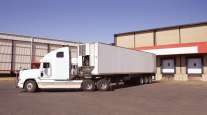Staff Reporter
ATRI Calls on Feds to Step Up AV Policy Efforts

[Stay on top of transportation news: Get TTNews in your inbox.]
The federal government needs to do more to establish a comprehensive policy regarding autonomous vehicle technology in the trucking industry, according to the latest research from the American Transportation Research Institute.
ATRI’s research, titled “Redefining the Role of Government Activities in Automated Trucking,” was published Jan. 13, less than a week after the Department of Transportation released AV 4.0, which serves as the agency’s policy update of autonomous vehicle technology guidelines.
Despite this guidance, the federal government lacks a detailed road map for applying autonomous technologies in the trucking industry, ATRI says. Congress has yet to enact a law governing AV technology development for trucks nationwide.
ATRI Redefining Role of Gov... by Transport Topics on Scribd
“Right now, I don’t believe that we have a solution in place,” ATRI Senior Vice President Dan Murray told Transport Topics. “I don’t believe we have the blueprint we need in place, even with the latest U.S. DOT action.”
In part one of a two-part exploration of autonomous technology today, our latest RoadSigns podcast revisits conversations with CEOs Alex Rodrigues of Embark and Cetin Mericli of Locomation. Hear them explain what testing automated trucks and developing platooning technology has taught them about the road ahead — and get new perspective with host commentary. Listen to a snippet from Rodrigues above, and to hear the full episode, go to RoadSigns.TTNews.com.
The analysis encourages DOT to promulgate legislation listing recommended practices for states and municipalities, many of which have been active in the testing and deployment of AV technology. So far, 35 states have enacted policy, such as legislation or executive orders, related to testing AV technologies on public roadways. Some 50 cities have conducted or planned pilot tests of AV technology, mostly geared toward passenger vehicle operations. DOT has generally been hands-off regarding these pilots, which ATRI’s analysis says has created a piecemeal approach to testing.
The result, ATRI’s research contends, is an “incomplete patchwork” of regulations among states, which has hindered the development and adoption of AV technology in the trucking industry. Because navigating around different regulations can present challenges for truckers, the analysis notes that AV technology deployment may be confined to local or regional levels. Murray said that AV development will remain problematic for truckers if they have to worry about making adjustments, such as shifting their platooning operations, when crossing state lines.
“We don’t want the tail wagging the dog when it comes to any aspect of interstate commerce and trucking,” Murray said.
New #ATRI Release - New Research Helps Redefine the Role of Government Actions on Autonomous Truck Testing https://t.co/t2XQxq17vC #Trucking #TruckingResearch — Rebecca Brewster (@ATRIPREZ) January 13, 2020
In addition to providing guidance for local, state and interstate testing, the research also says a standardized framework could help bolster public confidence in AV technology. The establishment of technical standards can also aid law enforcement officers who perform vehicle inspections and diesel technicians who perform maintenance.
ATRI’s research notes that, while states have the right to create policy and ensure safety, federal and state officials must avoid establishing policies that needlessly delay the testing or deployment of technology that can improve safety.
“It has to come from [the national level]. Local jurisdictions, by definition, don’t have the big picture,” Murray said. “We really need the U.S. DOT to come in full-bore and provide not just guidance but possibly regulations, national policy, and maybe even tie funding to it.”
Want more news? Listen to today's daily briefing:





